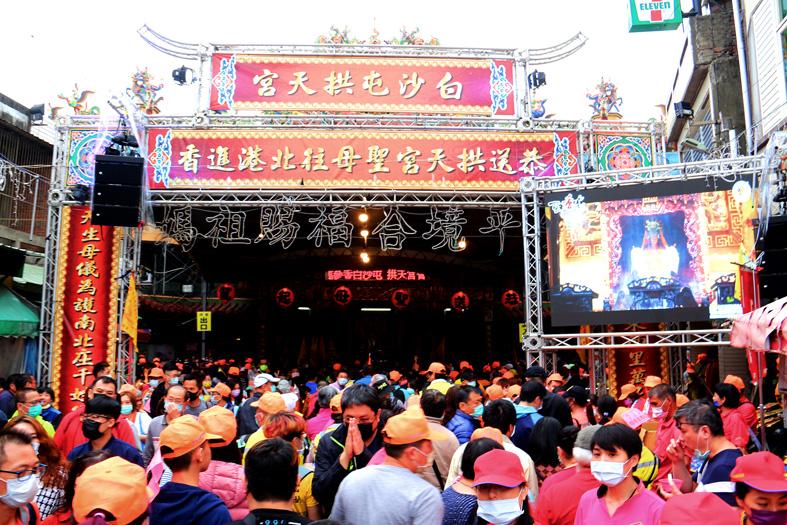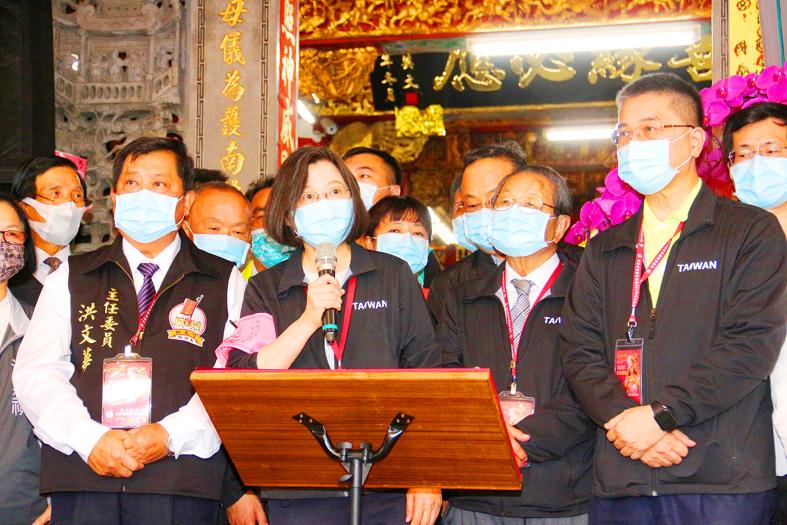The Baishatun Matsu Pilgrimage, one of the largest annual religious processions in Taiwan, was to set off from Miaoli County’s Baishatun (白沙屯) last night.
The procession of the sea goddess Matsu (媽祖) is being organized by the Gong Tian Temple (拱天宮).
President Tsai Ing-wen (蔡英文) visited the temple in the afternoon to dedicate a plaque and take part in a ritual to move the deities from their seats in the temple to prepare them for the procession.

Photo: CNA
Tsai said she prayed to Matsu to bring relief from the current water shortage.
She was accompanied by central and local government officials including Minister of the Interior Hsu Kuo-yung (徐國勇) and Miaoli County Commissioner Hsu Yao-chang (徐耀昌), as well as former minister of culture Cheng Li-chiun (鄭麗君).
About 78,000 people have signed up to participate in this year’s procession, which is to travel 400km to Chao Tian Temple (朝天宮) in Yunlin County’s Beigang (北港) and back.

Photo: CNA
A record 55,000 people participated in last year’s event, the organizers said.
Gong Tian Temple late on Thursday began pre-procession rituals by raising a banner to announce the start of this year’s pilgrimage. Worshipers have since flocked to the temple, bringing offerings of food and praying for a smooth journey.
The banner was to be carried at the front of the procession, which was scheduled to set off at 11:40pm yesterday.
The pilgrimage is officially recognized as the longest in Taiwan and is also known for its unplanned route, which is determined by the way in which Matsu’s palanquin moves or tilts during the procession.
Only the date of arrival at the Yunlin temple and the return date to Miaoli are fixed, having been decided by Matsu during a ritual held before the Lunar New Year.
Otherwise, the procession makes sudden turns and stops that are interpreted as reflecting the deity’s intentions, according to the Ministry of the Interior’s Web site on Taiwan’s religions.
This year, the procession is scheduled to arrive at the Chao Tian Temple on Friday, when a fire would be lit for worshipers to take back to the Gong Tian Temple.
The procession would begin the return journey on the same day to make it back to Miaoli by Monday next week, and a ritual using the fire would be held to “renew the divine spirit.”
In comparison, the 350km Dajia Matsu Pilgrimage from Taichung to Chiayi and back, which started on Friday, follows a list of temples where Matsu stops during the nine-day journey.
If the Baishantun Matsu Pilgrimage takes Provincial Highway No. 1 on its way south, it could meet up with the Dajia Matsu Pilgirmage in Yunlin on Wednesday, the organizers said.
Traffic control measures would be in place in Miaoli for the start of the procession, and the organizers said they have streamlined rituals for this year’s event amid COVID-19 restrictions.
Worshipers are urged to follow health authorities’ disease prevention guidelines, which includes not kneeling under the palanquin to seek the deity’s blessing, the organizers said.
Additional reporting by Tsai Cheng-min

MORE VISITORS: The Tourism Administration said that it is seeing positive prospects in its efforts to expand the tourism market in North America and Europe Taiwan has been ranked as the cheapest place in the world to travel to this year, based on a list recommended by NerdWallet. The San Francisco-based personal finance company said that Taiwan topped the list of 16 nations it chose for budget travelers because US tourists do not need visas and travelers can easily have a good meal for less than US$10. A bus ride in Taipei costs just under US$0.50, while subway rides start at US$0.60, the firm said, adding that public transportation in Taiwan is easy to navigate. The firm also called Taiwan a “food lover’s paradise,” citing inexpensive breakfast stalls

TRADE: A mandatory declaration of origin for manufactured goods bound for the US is to take effect on May 7 to block China from exploiting Taiwan’s trade channels All products manufactured in Taiwan and exported to the US must include a signed declaration of origin starting on May 7, the Bureau of Foreign Trade announced yesterday. US President Donald Trump on April 2 imposed a 32 percent tariff on imports from Taiwan, but one week later announced a 90-day pause on its implementation. However, a universal 10 percent tariff was immediately applied to most imports from around the world. On April 12, the Trump administration further exempted computers, smartphones and semiconductors from the new tariffs. In response, President William Lai’s (賴清德) administration has introduced a series of countermeasures to support affected

CROSS-STRAIT: The vast majority of Taiwanese support maintaining the ‘status quo,’ while concern is rising about Beijing’s influence operations More than eight out of 10 Taiwanese reject Beijing’s “one country, two systems” framework for cross-strait relations, according to a survey released by the Mainland Affairs Council (MAC) on Thursday. The MAC’s latest quarterly survey found that 84.4 percent of respondents opposed Beijing’s “one country, two systems” formula for handling cross-strait relations — a figure consistent with past polling. Over the past three years, opposition to the framework has remained high, ranging from a low of 83.6 percent in April 2023 to a peak of 89.6 percent in April last year. In the most recent poll, 82.5 percent also rejected China’s

PLUGGING HOLES: The amendments would bring the legislation in line with systems found in other countries such as Japan and the US, Legislator Chen Kuan-ting said Democratic Progressive Party (DPP) Legislator Chen Kuan-ting (陳冠廷) has proposed amending national security legislation amid a spate of espionage cases. Potential gaps in security vetting procedures for personnel with access to sensitive information prompted him to propose the amendments, which would introduce changes to Article 14 of the Classified National Security Information Protection Act (國家機密保護法), Chen said yesterday. The proposal, which aims to enhance interagency vetting procedures and reduce the risk of classified information leaks, would establish a comprehensive security clearance system in Taiwan, he said. The amendment would require character and loyalty checks for civil servants and intelligence personnel prior to